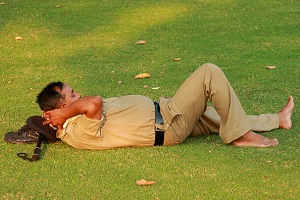The police officer in your locality is always irritated and does not perform his duties with dedication because he is “fatigued”, a study conducted by the Bureau of Police Research and Development (BPRD) has found. The study said a majority of Indian police officers, especially below the rank of inspector, face severe to mild fatigue due to erratic duty hours, extended shift duties, sudden onset of emergency, lack of proper/good sleep, poor and untimely food, not being able to meet families even after duty hours, behaviour of their superiors, smoking, alcohol intake, un-availability of basic facilities or no time to even bathe.
Mental and physical fatigue led to policemen losing their temper, showing poor judgment, having difficulty in concentration, impaired recollection of timing and events, ineffective interpersonal communication, reduced hand-eye coordination, reduced visual perception, reduced vigilance and slow reaction times.
The study, “Research Study on Fatigue in Police Personnel: Causes and Remedies’, conducted by Post-Graduate Institute of Medical Education and Research at Ram Manohar Lohia Hospital and sponsored by BPRD, said 91.79% police officers felt fatigued. The study found that common causes of fatigue were because of erratic duty hours (74.25%), sudden onset of emergency (70.42%), extended shift duties (70.79%), lack of proper sleep (62.12%) and poor and untimely food in-take (59.34%). Other causes were: not able to meet family even after duty hours (49.5%) and living away from family (45.4%). Lack of facilities at work like sleeping place, exercise ground, sanitary and health facilities (16.5%) and behaviour of higher officers (10.89%) also led to fatigue. While 13.8% of policemen reported fatigue interfering even with their ability to bathe and dress themselves, 20% said they were not able to concentrate and 19.6% had mood swings due to tiredness.








